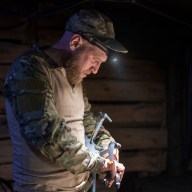Stephen Malkmus just moved his wife and two children to Berlin. But it has nothing to do with the reasons rock ’n’ rollers have traditionally gone there.
“Even though I know this is a big place to take drugs and party, it’s also like a really child-friendly place, too,” he says. “We just thought a change was good for our life situation.”
A change has done the former Pavement frontman good in his professional situation, too. For his fifth album with his band, the Jicks, he brought in Beck to produce. The result is “Mirror Traffic,” a collection that sees Malkmus’ witty turns of phrases married to sounds that are more artsy than the straight-ahead guitar sounds he had lately been seeming to favor.
Walk me through the evolution of Beck being somebody you might have admired as a contemporary to somebody that could produce your album.
It’s a really short walk. He called and said he was a producer now. I hadn’t heard from him and then out of the blue … he mentioned that. It just happened to coincide with the time we were going to be recording, and we were looking to find someone cool who wasn’t a really obvious choice. He just basically called us and in my mind it was done, and we should just go there and see how he does stuff. It wasn’t a big decision. It was like, made for me.
Were there any moments in working with him where there was any resistance, either on your part or his?
Well, yeah. He would often want to make things a little less classic rock-sounding. Some of the songs that were just more standard Jicks songs, he would want to put the guitars in direct and plug them right into the board without an amp and make them sound more up front and things poke out more. Sometimes I would think, “that’s odd.” It gave it different sound, which is important. It doesn’t necessarily sound like everything sounds like now, which is probably not good for selling records, but overall it’s good. I think he was just trying to get some sort of sonic signature that was different; different from what we did before and different than other things, and I think that’s a good idea.

















